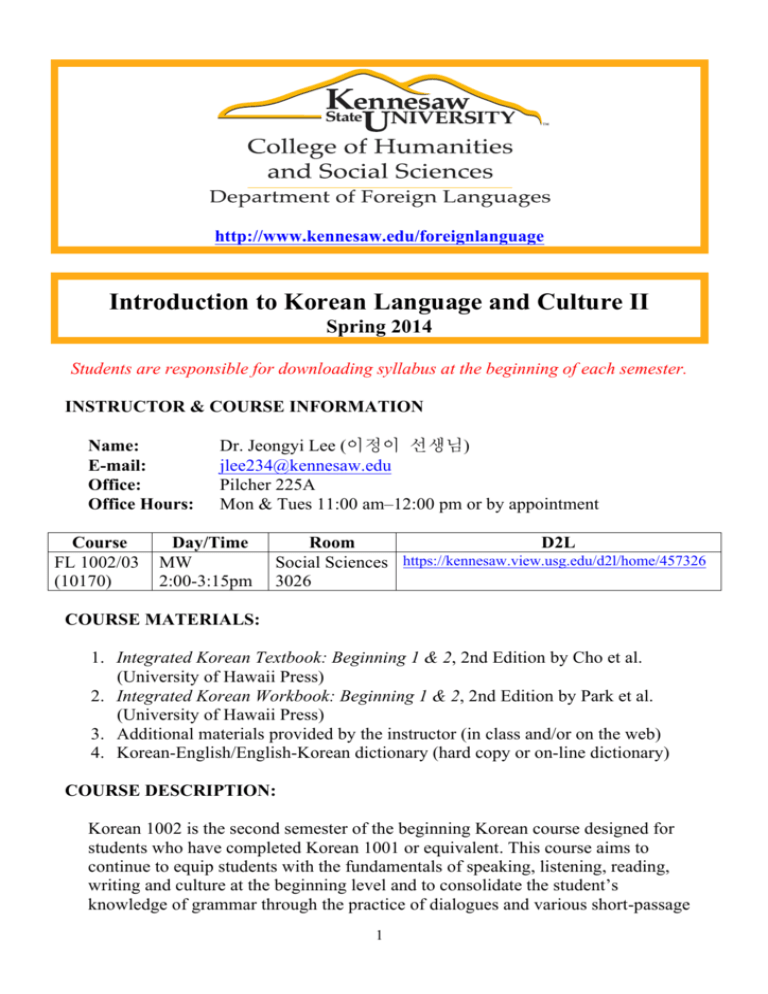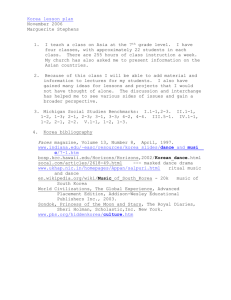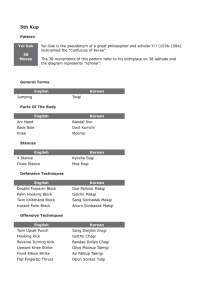KORE 1002 (Spring 2014)
advertisement

http://www.kennesaw.edu/foreignlanguage Introduction to Korean Language and Culture II Spring 2014 Students are responsible for downloading syllabus at the beginning of each semester. INSTRUCTOR & COURSE INFORMATION Name: E-mail: Office: Office Hours: Course FL 1002/03 (10170) Dr. Jeongyi Lee (이정이 선생님) jlee234@kennesaw.edu Pilcher 225A Mon & Tues 11:00 am–12:00 pm or by appointment Day/Time MW 2:00-3:15pm Room D2L https://kennesaw.view.usg.edu/d2l/home/457326 Social Sciences 3026 COURSE MATERIALS: 1. Integrated Korean Textbook: Beginning 1 & 2, 2nd Edition by Cho et al. (University of Hawaii Press) 2. Integrated Korean Workbook: Beginning 1 & 2, 2nd Edition by Park et al. (University of Hawaii Press) 3. Additional materials provided by the instructor (in class and/or on the web) 4. Korean-English/English-Korean dictionary (hard copy or on-line dictionary) COURSE DESCRIPTION: Korean 1002 is the second semester of the beginning Korean course designed for students who have completed Korean 1001 or equivalent. This course aims to continue to equip students with the fundamentals of speaking, listening, reading, writing and culture at the beginning level and to consolidate the student’s knowledge of grammar through the practice of dialogues and various short-passage 1 readings and composing short paragraphs. Approximately 1 lesson will be covered for 4 class meetings, and there will be a vocabulary quiz and a test for each lesson to help you maximally reinforce your learning. COURSE REQUIREMENTS & GRADING: 1. Homework 2. Quizzes/Tests/Exams 3. Skit Presentations 4. Weekly Journal Composition 5. Class Attendance & Participation 6. Bonus Points 25% (20%+5%) 45% (10%+20%+15%) 5% 10% 15% 1. Homework (25%): A. Workbook Homework for Vocabulary/Grammar Review (20%) § After each Conversation, students will be expected to do the assigned section of the Workbook, consisting of vocabulary and grammar exercises from the Conversation of each lesson. For listening exercises, refer to the sound file available at http://kleartextbook.com/category/b_beginning/a_audio-files/. § Then, using an answer key posted on our course D2L (Go to http://d2l.kennesaw.edu/ and log in to KSU Desire2Learn. Then, find our course in My Courses list), students correct their own homework. Please use a different colored pen for self-correction. § Students should then submit the self-corrected homework for grading according to the Course Schedule. For each submission, make sure to staple all the pages together and write your name on it. § Turn in your homework on the teacher’s desk before the class begins. § Your Workbook homework will be evaluated for: (1) completion of initial work on your own; (2) self-correction; and (3) on-time submission. If any of these criteria won’t be met, it will be considered late. § For exercises on the Textbook, it will be checked in class by reading/writing it in class. B. Reading & Recording Homework (5%) § For your reading skills and to improve your pronunciation, recording your reading of each lesson’s narrative text (Narration). § Before recording the Narration, read aloud the text at least 10 times. Check your pronunciation and intonation either by asking a student tutor at FLRC or your conversation partner or by listening to the sample on-line sound file for each text available at http://kleartextbook.com/category/b_beginning/a_audio-files/. § When you are ready to record, go to the FLRC language lab and find a computer booth that will be quiet. Speak loudly and clearly, close to the microphone but not directly into it with a puff of air. Don’t breathe into the microphone; speak about 3 inches from the microphone so there will be no 2 air puffs, but you should be close enough to the microphone so your voice is loud and clear. § Record yourself reading the passage using the software program, Audacity. Before starting to record, make sure the computer terminal you are using is capable of saving the recorded file in the desired format. § Save your sound file in the MP3 format. Name them using your own name (for example, lesson1david.MP3). Upload your file to the designated Dropbox folder in our course D2L by each Lesson Test date. See the Course Schedule below for the due date for each recording. § Your recording will be evaluated for: (1) accuracy of pronunciation; (2) speed (displays obvious evidence of practice) and (3) appropriate pausing, intonation; fluency (shows the student understands what’s being read). 2. Written Quizzes, Tests and Exams (45%): A. Vocabulary Quizzes (10%) § There will be 6 vocabulary quizzes throughout the semester. § A vocabulary quiz for each lesson will be given on the third day of each lesson. § A vocabulary quiz for each lesson consists of word meaning recognition by reading and listening B. Lesson Tests (20%) § There will be 6 tests for the lessons covered throughout the semester. § A test will be given on the last day of each lesson. § A test for each lesson consists of filling in the blanks, reading/listening comprehension, dictation and translation of sentences, writing and grammar, vocabulary incorporated. C. Comprehensive Exams (15%) § Two written exams (5% each) are comprehensive and cumulative based on your previous vocabulary/listening quizzes and tests. § The first comprehensive exam, covering Lessons 6-8, will be given during the midterm point (Mar. 3); the second exam, covering Lessons 9-11, will be given on Apr. 28. § For the oral exam (5%), you will be asked to carry on a conversation for 510 minutes on the topics covered this semester. The oral exam will be given on the final exam date (May 7). You will sign up for the time later. Your oral exam will be evaluated for (1) natural command of conversation, including appropriate intonation and pausing; (2) correct usage of grammar and vocabulary; and (3) fluency and accurate pronunciation. 3. Skit Presentations (5%) § For each Lesson, you will be paired with another student (except Conversation 1 of Lesson 1) (your instructor will form a team for each Lesson) and present each dialogue skit of the Lesson. See the Course Schedule below for the skit presentation schedule. Your team will be announced later. 3 § For your skit presentation, use your creativity in modifying the skit of the Lesson as much as you can, practice it with your partner, and act it out in class as natural and real as possible. § Your presentation will be evaluated for: (1) creativity of the skit; (2) memorization of the skit; (3) natural, real acting; (4) fluency and pronunciation; and (5) use of materials such as props. 4. Weekly Journal Composition (10%) § Weekly Journal Composition assignments are given to test your ability and help you build skills to use the grammar points and vocabulary items that you have learning in class. § For the Journal, write 5-7 sentences every week (due every Sunday midnight) in Korean on the designated Dropbox folder in our course D2L. § You don’t have to keep your sentences connected, but write sentences practicing grammar and vocabulary you learned. § You are encouraged to used an English-Korean dictionary, and do NOT let any native speaker of Korean correct or (re-)write your composition for you. If they do not like a particular sentence of yours, ask what is wrong with it and learn how to fix it. § Your composition will be evaluated for (1) originality and creativity of content; (2) use of correct and natural vocabulary including spelling; (3) use of accurate grammar; (4) required length; and (5) on-time submission. 5. Class Attendance and Participation (15%): § Your attendance will be tracked very carefully and strictly every day. Fifteen-minute (or more) tardiness will result in a half point of daily attendance/participation grade for that day. § Active participation in various activities and enthusiastic speaking in Korean in class 6. Bonus Points: Students can earn extra bonus points by completing cultural activities and/or lab activities. A. Cultural Activities: Earn 1 bonus point by attending three different cultural events related to Korean culture and writing a brief account of the experience (200 words minimum per event). For every 3 cultural activities (please present documentation and/or narratives to your instructor) at the END of the semester, for a maximum of 3 points (3% added to the final grade). Suggestions for cultural events include, but not limited to: § Watching Korean movies/dramas. § Participating in the activities organized by the KSU Korean Student Association, such as general meetings, culinary events, Korean festive days events, etc. § Attending Korean events held at other universities or at venues such as museums, restaurants, etc. in the Atlanta area § Exploring the Web to learn more about the Korean-speaking world 4 B. FLRC Activities: Earn bonus points by spending time in the Foreign Language Resource Center. BEFORE EACH TEST, STUDENTS ARE REQUIRED TO SPEND AT LEAST 1 HOUR WORKING IN THE FLRC. Each time you visit the FLRC, your entry and exit times will be recorded in the system. You will receive 1 point (1% added to the final grade) for every 10 hours logged in FLRC. Suggestions for lab activities include: § Working with a tutor for test/reading and conversation practice § Doing Reading & Recording homework § Reading a Korean magazine § Working on Korean websites to explore Korean culture online GRADING SCALES: Scores in Letter Numeric Criteria percentage grade grade 90-100% A 4.0 1. Perfect attendance and active participation 2. Excellent command of grammar and vocabulary usage in speaking, listening, reading, writing, and culture a. Complete understanding of the grammar material b. Correct spelling and usage of vocabulary 80-89% B 3.0 Satisfactory grammar and vocabulary usage in speaking, listening, reading, writing, and culture 70-79% C 2.0 Mediocre grammar and vocabulary usage in speaking, listening, reading, writing, and culture 60-69% D 1.0 Poor grammar and vocabulary usage in speaking, listening, reading, writing, and culture 59% or F 0.0 Fail lower This course is a very crucial beginning level class! Make every effort to be on time for class. Study outside the classroom and review every day. Prepare for the quizzes/tests/exams. And ask for help! Finally, keep in mind that practice is everything! 5 COURSE SCHEDULE: § Be sure to remember the due date for each assignment. § Recording & Composition assignments are to be uploaded onto D2L by midnight of the due date. § This schedule is tentative and may be changed. If so, you will be notified of the changes in class or by email. “As the instructor for this course, I reserve the right to adjust this schedule in any way that serves the educational needs of the students enrolled in this course.” Week Monday Wednesday 1/8 First Day of Class Introduction & Preliminary Lesson 1/15 WB (135-140) Lesson 6 1/22 WB (141-148) Lesson 6 & Vocabulary Quiz (1) 1 2 3 4 5 6 7 8 9 10 11 12 13 14 15 16 17 1/13 Word Search (L6) Lesson 6 1/20 MLK Day (마틴루터킹의 날) No Class! 수업이 없어요! 1/27 WB (149-156)/Recording (L6) DUE 1/29 Word Search (L7) Skit Presentation (1)/Lesson Test (1) Lesson 7 2/3 WB (157-162) 2/5 WB (163-172) Lesson 7 Lesson 7/Vocabulary Quiz (2) 2/10 WB (173-178)/Recording (L7) DUE 2/12 Word Search (L8) Skit Presentation (2)/Lesson Test (2) Lesson 8 2/17 WB (179-184) 2/19 WB (185-194) Lesson 8 Lesson 8/Vocab Quiz (3) 2/24 WB (195-201)/Recording (L8) DUE 2/26 WB (213-224: not required) Skit Presentation (3)/Lesson Test (3) Review for Exam (I) 3/3 3/5 Word Search (L9) Comprehensive Exam (I) Lesson 9 3/10 WB (1-8) 3/12 WB (9-16) Lesson 9 Lesson 9/Vocab Quiz (4) 3/17 WB (17-22)/Recording (L9) DUE 3/19 Word Search (L10) Skit Presentation (4)/Lesson Test (4) Lesson 10 3/24 WB (23-30) 3/26 WB (31-38) Lesson 10 Lesson 10/Vocab Quiz (5) 3/31 Spring Break (봄방학) 4/2 Spring Break (봄방학) No Class! 수업이 없어요! No Class! 수업이 없어요! 4/7 WB (39-44)/Recording (L10) DUE 4/9 Word Search (L11) Skit Presentation (5)/Lesson Test (5) Lesson 11 4/14 WB (45-54) 4/16 WB (55-64) Lesson 11 Lesson 11/Vocab Quiz (6) 4/21 WB (65-68)/Recording (L11) DUE 4/23 Skit Presentation (6)/Lesson Test (6) Review for Exam (II) 4/28 4/30 Last Day of Class Comprehensive Exam (II) Review for Final Final Oral Exam: Wednesday, May 7, 1:00-3:00 pm REMEMBER! March 3 is the last day to withdraw without academic penalty. 6 STUDENT RESPONSIBILITIES: Throughout the week, your teacher will introduce and reinforce/clarify grammar and vocabulary use, and help you internalize what you have learned. To keep up with the materials covered in class and get a decent grade (3.0 or above), follow the guidelines provided below: 1. Daily attendance is essential. You are expected to be at every class session unless you are so ill that you are unable to come to campus at all. If you must miss a class period for any reason, please contact the instructor via e-mail to let her know that you will not be in class. Unless provided with an official proof for a justifiable reason of absence, your absence will be strictly tracked and result in no credit for attendance. In case of absence, be sure to get your assignment(s) turned in through your classmate or directly to the instructor’s office in order to receive a full credit. For this, get at least three classmates’ contact information. The best solution is not to miss class. 2. Come to class on time and actively participate. Much learning will take place in class, and it is crucial to your learning that you come to class on time every day. Not only will tardiness greatly reduce your class participation grade, it is also disruptive to the class and disrespectful to your professor and peers. 3. Late work will be accepted but only a half of the full point will be given. No feedback, corrections or revision will be given. Incomplete work (no selfcorrection included) will be considered late. Missing a class is no excuse for not preparing an assignment. 4. No make-ups will be given for missed tests, quizzes, exams unless you submit a doctor’s note or other University accepted excuses. Only under extreme circumstances make-up tests are given. 5. This 3-credit course has a minimum expectation of 9 hours per week working outside of class. Students in this class are expected to have thoroughly studied the vocabulary and grammar of each lesson before class. Set aside at least 2 hours every day to work on Korean, one hour for review of the day’s material and homework and another hour for studying the next day’s material. 6. Make it a daily habit that you practice listening. Listening to the audio files on the web, reading aloud the dialogues/narrations, and having tutor and conversation partners all will help improve your listening skills. Also, use various web resources as much as you can. 7. Use vocabulary in context, making vocabulary relevant to your daily life. It will be easier to memorize: How do you know when you are done studying vocabulary? See whether you can do Korean to English, and then English to 7 Korean. Don’t just follow the given order. Do a random check. Put it aside for a few hours. Try it again. If you can’t recall words, concentrate on those words. Use each vocabulary item in a sentence. If you can’t recall a word, you are not quite done with the task! 8. Take advantage of this class, your teacher, tutor and a conversation partner. Speaking and listening skill improvement time will be limited in class. If you have questions or need additional help, it is your responsibility to visit your teacher during her office hours and a tutor at FLRC, and a conversation partner is highly recommended for this course. It will make your learning easier, fun and successful! 9. Email is the official means to communicate. All students enrolled in this course are responsible for checking the your email regularly. 10. DISABILITY POLICY: Kennesaw State University provides program accessibility and reasonable accommodations for persons identified as disabled under Section 504 of the Rehabilitation Act of 1973 or the Americans with Disabilities Act of 1990. A number of services are available to help the disabled. Students must visit the office of Disabled Student Support Services (770-4236443) and arrange an individual assistance plan. In some cases, certification of disability is required. 11. ACADEMIC INTEGRITY: Every KSU student is responsible for upholding the provisions of the Student Code of Conduct as published in the Undergraduate and Graduate Catalogs. Section II of the Student Code of Conduct addresses the University’s policy in academic honesty, including provisions regarding plagiarism and cheating, unauthorized access to University materials, misrepresentation/falsification of University records or academic work, malicious removal, retention, or destruction of library materials, malicious/intentional misuse of computer facilities and/or services, and misuse of student identification cards. Incidents of alleged academic misconduct will be handled through the established procedures of the University Judiciary Program, which includes either an “informal” resolution by a faculty member, resulting in a grade adjustment, or a formal hearing procedure, which may subject a student to the Code of Conduct’s minimum one-semester suspension requirement. 12. CLASSROOM RULES: To enhance our learning experience in our class, let us observe the following class rules! If you don’t observe the classroom rules, it will make a bad impact on your participation grade. § No food during class unless you bring enough food to share with entire class! (Non-alcohol drink is OK.) § No electronic devices except for dictionary usage! (Turn off your cell phone and put it away during class) § No unnecessary talking, irrelevant to class instruction, especially in English. 8 § No homework done in class! (Homework is work for home.) § No newspaper/magazine/book reading, irrelevant to instruction! STUDENT LEARNING OUTCOMES: With completion of this second half of the first-year Korean course, students will be able to (1) take the first semester of the second-year Korean or an equivalent program; (2) speak Korean on a variety of topics with a beginning level of grammar and vocabulary; (3) understand main ideas and supporting ideas when listening to people talk about familiar topics; (4) understand short, simple readings on familiar topics; (5) write/type a series of simple sentences on topics of interest in Korean; and (6) have some understanding of Korean culture and society. This course will contribute to the attainment of the following general (GSLO) and specific (SSLO) student learning outcomes of the B.A. in Modern Language & Culture (ML&C): ML&C GSLO 1: LANGUAGE, LINGUISTICS, & COMPARISONS Learners are proficient in using the target language, are familiar with the target language system, and seek opportunities to further develop their skills and knowledge. (Knowledge, Skills, Attitudes) ML&C SSLO 1a: Demonstrating Language Proficiency Learners demonstrate a high level of proficiency in the target language, and they seek opportunities to strengthen their proficiency. (Knowledge, Skills, Attitudes) To address this outcome, learners will: - Develop speaking skills by communicating in the target language, narrating and describing current events. Upon completion of KOREAN 1002, learners are expected to be at the Novice-High level on the ACTFL scale Assessment: • In-class pair and group activities • Classroom presentation(s) • Oral exam - Develop listening skills (such as listening for the gist and/or for specific information) by listening to their instructor and classmates and to recordings and videos. Assessment: • In-class listening activities 9 • Listening section of workbook, tests and exams - Develop writing skills by writing narratives of present events and dialogues related to everyday situations. Upon completion of KORE 1001, learners are expected to be at the Novice-High level on the ACTFL scale. Assessment: • Writing assignments • Writing section of tests and exams • Writing section of the final project - Develop reading skills by reading brief texts of all kinds, including excerpts form newspaper and magazine articles, brief excerpts from literary works, web pages, and realia. Assessment: • • • • In-class reading activities In-class and at-home reading assignments Reading section of tests and exams Reading components of the final project ML&C SSLO 1b: Understanding Linguistics Learners know the linguistic elements of the target-language system, recognize the changing nature of language, and accommodate for gaps in their own knowledge of the target-language system by learning on their own. (Knowledge, Skills, Attitudes) To address this outcome, learners will: - Discuss and reflect upon the rules that govern the formation of words and sentences in the target language. - Study the grammar, pronunciation and syntax of target language, applying them when communicating in the target language. Assessment: • Accurate use of target forms in classroom activities, homework assignments and grammar and writing sections of tests and of the final project ML&C SSLO 1c: Identifying Language Comparisons 10 Learners know the similarities and differences between the target language and other languages, identify the key differences in varieties of the target language, and seek opportunities to learn about varieties of the target language on their own. (Knowledge, Skills, Attitudes) To address this outcome, learners will: - Contrast and compare target language with native language. Assessment: • Accurate use of target forms in speaking and writing in classroom activities, tests/exams, and the final project ML&C GSLO 2: CULTURES & LITERATURES Learners know the literature and culture of the target language countries. They use this knowledge to interpret and reflect upon the perspectives of the target culture in relation to its practices and products. (Knowledge, Skills, Attitudes) ML&C SSLO 2a: Demonstrating Cultural Understandings Learners demonstrate that they understand the connections among the perspectives of a culture and its practices and products. (Knowledge, Skills) To address this outcome, learners will: - Reflect upon the practices and products of the target culture by discussing, reading and investigating issues related to the target culture. - Work with realia that are representative of different cultural aspects of the target culture. Assessment: • Cultural components in homework assignments, classroom activities, classroom presentations • Active participation in class discussions • Culture section of tests and the final project ML&C SSLO 2b: Demonstrating Understanding of Literary and Cultural Texts and Traditions Learners recognize the value and role of literary and cultural texts and use them to interpret and reflect upon the perspectives of the target cultures over time. (Knowledge, Skills, Attitudes) To address this outcome, learners will: 11 - Read and discuss brief excerpts from literary and cultural texts of all genres in the target language. Assessment: • Cultural components in homework assignments, classroom activities, classroom presentation(s) • Active participation in class discussions • Culture section of tests and the final project HELPFUL RESOURCES: At KSU Foreign Language Resource Collection (FLRC) http://www.kennesaw.edu/foreignlanguage/FLRC_ALL/index.html Conversation Partners Program http://www.kennesaw.edu/uc/global/conversation.html http://www.kennesaw.edu/uc/esl/files/CPP%20Application-1.pdf Asian Studies Program http://asianstudies.hss.kennesaw.edu/ http://www.kennesaw.edu/saupo/home.php (SAUPO) Education Abroad Office http://www.kennesaw.edu/studyabroad/ Korean Student Association http://www.kennesaw.edu/student_life/rso.php Outside KSU On-line Korean Courses http://world.kbs.co.kr/learn_korean/lessons/e_index.htm (KBS World) http://world.kbs.co.kr/learn_korean/english/ (KBS World) http://www.sejonghakdang.org/nuri/sjc/SJC_Main (King Sejong Institute) http://study.korean.net/servlet/action.app.StyAction (Study Korean) http://www.kosnet.go.kr/ksad/ (Korean Language Study on the Internet) http://korean.sogang.ac.kr/ (Sogang Korean Program) http://korea.prkorea.com/wordpress/english/category/lets-learn-korean/ (VANK) On-line Dictionaries http://dic.naver.com/ (NAVER 사전) http://www.koreandictionary.net/ (Korean Dictionary) 12 On-line Korean Newspapers http://www.koreaherald.com/ (Korean Herald) www.koreatimes.co.kr/www/index.asp (Korea Times) http://english.yonhapnews.co.kr/ (Yonhap News) http://english.chosun.com/ (Chosunilbo) http://koreajoongangdaily.joins.com/ (Korea JoongAng Daily) http://english.donga.com/ (Dong-A Ilbo) http://www.hani.co.kr/ (Hankyoreh) http://www.hankooki.com (Hankook Ilbo) Broadcasting in Korea http://www.arirang.co.kr/index.asp (Arirang) http://world.kbs.co.kr/english/ (KBS World Radio) http://www.kbs.co.kr (KBS) http://www.ebs.co.kr (EBS) http://www.imbc.com/ (MBC) http:///www.sbs.co.kr (SBS) Web Search Engines in Korea http://www.naver.com/ (NAVER) Traveling in Korea http://kto.visitkorea.or.kr/eng.kto (Korea Tourism Organization) http://www.visitkorea.or.kr/intro.html (Visit Korea) http://www.visitseoul.net/en/index.do?_method=main (Visit Seoul) http://eng.templestay.com/ (Temple Stay in Korea) Government Offices/Sites for General Information http://usa-atlanta.mofa.go.kr/korean/am/usa-atlanta/main/index.jsp (Consulate General of the Republic of Korea in Atlanta) http://seoul.usembassy.gov/ (Embassy of the U.S., Seoul, Korea) http://www.epik.go.kr/EPIK/html/main.jsp (Teaching English in Korea) http://www.talk.go.kr//talk/talk/talkhme/main.jsp (Teaching English in Korea) http://www.studyinkorea.go.kr/en/main.do (Study in Korea) http://www.korea.net/ (Official website of South Korea) http://koreana.or.kr/ (Quarterly on Korean Art & Culture) http://korea.prkorea.com/wordpress/english/ (Voluntary Agency Network of Korea) 13






